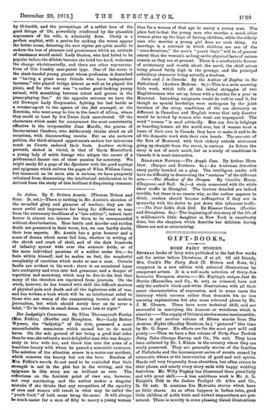Her Ladyship's Conscience. By Ellen Thorneycroft Fowler (Mrs. Felkin). (Hodder
and Stoughton. 65.)—Lady Esther Wyvern, the "ladyship" of the title, possessed a most uncomfortable conscience which caused her to do much harm. On the sole ground of her being a good deal older than he was, she refused a most delightful man who was desper- ately in love with her, and threw him into the arms of a heartless beauty with whom he passed a miserable existence. The solution of the situation comes in a motor-car accident, which removes the beauty but not the hero. Readers of Mrs. Felkin's novels do not need to be reminded that their strength is not in the plot but in the writing, and the epigrams in this story are as brilliant as ever. The reflections on the feminist point of view are, however, not very convincing, and the author makes a singular mistake if she thinks that any recognition of the equality of men and women will result in what may be called the "youth limit" of both sexes being the same. It will always be much easier for a man of fifty to marry a young woman than for a woman of that age to marry a young man. The plain fact is that the young man who marries a much older woman gives up the hope of having children, while the elderly man who marries a young girl does no such thing. As marriage is a contract in which children are one of the "considerations," the man's " youth limit" will be of greater extent than the woman's as long as the physical facts of nature remain as they are at present. There is a comfortable flavour of aristocracy and wealth about the novel, the chief actors being placed fairly high in the peerage, and the principal subsidiary character being actually a duchess.










































 Previous page
Previous page